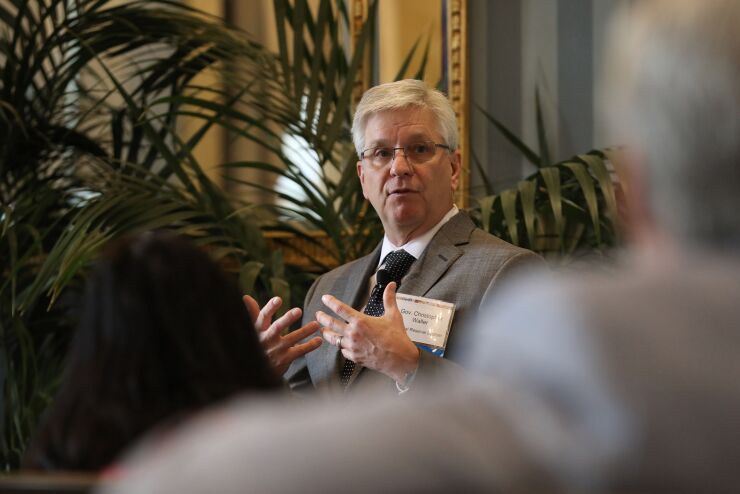
Bess Adler/Bloomberg
The Federal Reserve is poised to hold its benchmark interest rate steady later this month, but at least one central bank official believes it could get back to cutting rates again soon.
During an interview on CNBC on Thursday morning, Fed Gov. Christopher Waller said he anticipates the next rate reduction to come in the first half of this year, possibly during the Federal Open Market Committee’s second meeting of the year on March 6 and 7.
“I don’t think March could be completely ruled out, depending on what the data [shows],” Waller said. “Anything that kind of disrupts that is likely to push it back some, but as long as the data comes in good on inflation or continues on that path, I can certainly see rate cuts happening sooner than maybe the markets are pricing in.”
This view clashes with
Waller said his outlook is based on a belief that inflation remains on a steady downward trend, despite some “bumpy months” at the end of 2024. Indeed, Wednesday’s core consumer price index, or CPI, report from the Bureau of Labor Statistics showed that core annualized price growth declined from 3.3% in November to 3.2% in December — the first month-to-month decline since July,
The Fed’s target for annual inflation is 2% according to the Bureau of Economic Analysis’s Personal Consumption Expenditures index, which tends to register lower than CPI. The two measures typically move in sync with one another, meaning a lower PCE reading is likely later this month.
Waller said a cut at this month’s FOMC meeting, set for Jan. 28 and 29, is unlikely, as the committee wants to see how pricing trends adjust to the new calendar year. Still, he expects price growth to continue cooling.
“I make all my policy decisions based on the data and where I think the data is coming in, and right now, I think inflation is going to continue to come in towards our target, the year-over-year stickiness that we saw in 2024, I think, will start to dissipate,” Waller said. “I may be more optimistic about inflation coming down than the rest of my colleagues, and that’s what’s driving my outlook for the path for policy, but I don’t speak for the committee.”
Thursday’s comments were the
Waller, a PhD economist whose research has focused on monetary and macroeconomic theory, is often looked to as a voice of authority on the Fed’s monetary policy actions. He also one of two remaining Trump appointees on the Fed’s Board of Governors, along with Bowman.
Policy impact
During its last meeting, FOMC participants wrote down a broad range of expected policy pasts in the quarterly economic projections. Bowman took the most hawkish stance — meaning inflation wary — forecasting no policy adjustment this year, while one other member anticipated as many as five quarter-point cuts. Most expect between 25 and 75 basis points of easing.
Part of the hesitancy stems from the various levels of uncertainty among committee members regarding the economic impacts of the incoming Trump administration’s policies, particularly its emphasis on tariffs.
Waller, reiterating his comments from earlier this month, said he does not expect the import taxes to be inflationary. He noted that during the previous Trump administration many importers and retailers opted to absorb the costs of new tariffs themselves rather than pass them along to customers for fear of losing business and market share.
“Most of the [Wall] Street estimates are, it’s going to have some marginal effect and short lived effect on prices, because if it happens, it’s typically a level effect,” he said. “It’s not persistent inflation.”
Wildfires
Waller also weighed in on the potential economic ramifications of the wildfires that have ravaged southern California in recent weeks.
Despite the widespread damage and devastation brought on by the blazes, Waller said he does not expect the episode to be destabilizing to the broader U.S. economy.
“It’s always very disheartening to see this kind of damage and destruction to human beings and property, and it’s going to have a big effect locally, but in the aggregate, it’s just not going to have a huge impact on the aggregate economy,” he said. “Much like hurricanes, it can have disruptive effects, but … these are things we typically look through, because we know they’re not long lasting.”
